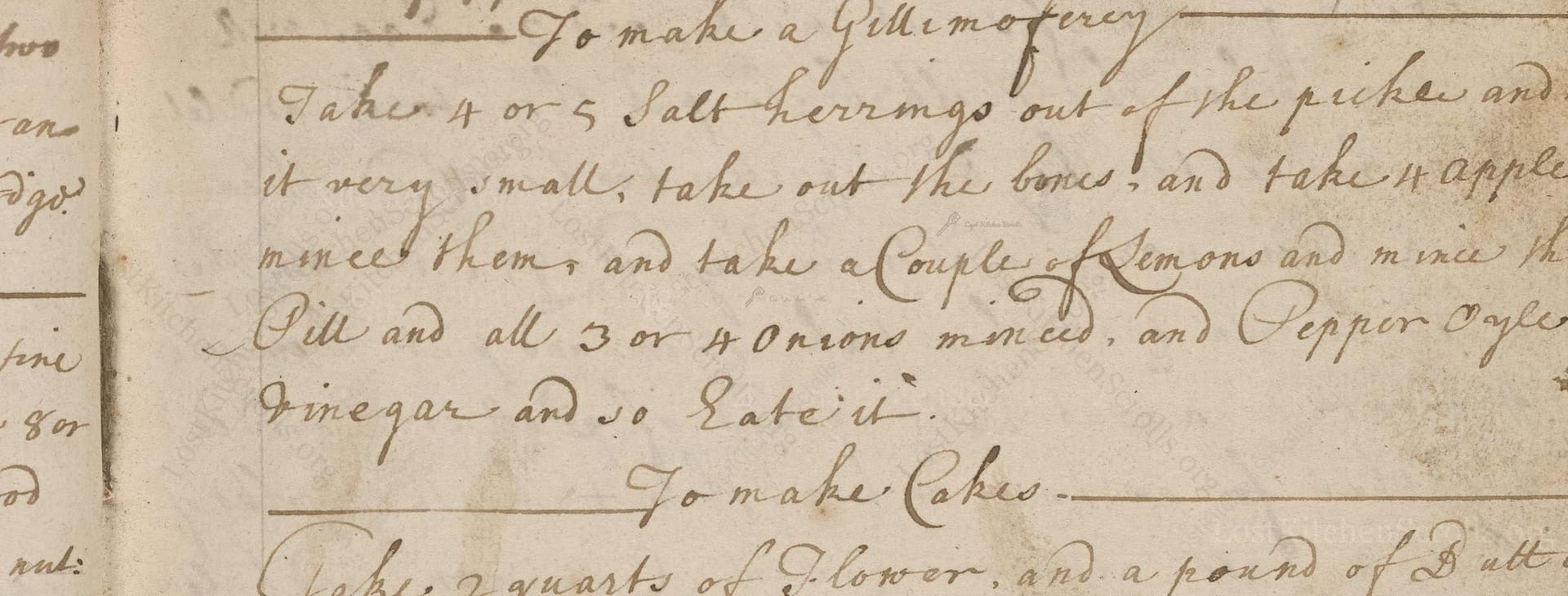
To Make A Gillmofercy
"Take 4 or 5 Salt herrings out of the pickel and mince it very small, take out the bones, and take 4 apples and mincd them, and take a Couple of lemones and mince them and 3 or 4 onions minced, and pepper Oyle and Vineagar and so Eate it."
Note on the Original Text
The recipe is written in a concise, instructive vernacular typical of the early 18th century, assuming the reader's familiarity with basic kitchen procedures. Ingredients are mentioned in order of use, with quantities somewhat vague but sensible to an experienced cook. Some archaic spelling is present, such as 'mincd' for 'minced,' 'lemones' for 'lemons,' and 'vineagar' for 'vinegar.' Instruction is direct: actions are described without explicit details on amounts, relying on the reader's judgement. This style reflects limited literacy and the oral transmission of culinary skills in the period, where measurement was approximate and recipes served as reminders rather than step-by-step guides.

Title
Receipt book of Dorothy Stone (1725)
You can also click the book image above to peruse the original tome
Writer
Dorothy Stone
Era
1725
Publisher
Unknown
Background
Step into the delicious world of early 18th-century kitchens with Dorothy Stone, where classic recipes and culinary curiosities await. Expect a charming medley of hearty fare, sweet treats, and the tasteful secrets of a bygone era.
Kindly made available by
Folger Shakespeare Library
This recipe hails from early 18th-century England, specifically around 1725, and was recorded by Dorothy Stone. At that time, preserved fish like salt herring was a kitchen staple, especially for households observing fish days or for inland cooks who lacked regular access to fresh seafood. The recipe showcases the creative use of preserved foods paired with fresh fruit and aromatic vegetables, yielding a vibrant, tangy-savoury salad. Dishes like this reflect both practical kitchen economy and a fashionable taste for punchy, contrasting flavours during the period.

To prepare this dish in the early 1700s, cooks would use a sturdy wooden chopping board and a sharp knife for mincing fish, apples, and onions. A small kitchen bowl or deep plate would be used to combine and dress the mixture. If available, a mortar and pestle might be used to grind peppercorns. Simple wooden or pewter spoons were employed for mixing and serving. All preparation was done by hand, making good knife skills essential. Pickled herrings were stored in barrels or jars, and vinegar and oil were kept in small stoppered bottles within the kitchen or pantry.
Prep Time
25 mins
Cook Time
0 mins
Servings
4
We've done our best to adapt this historical recipe for modern kitchens, but some details may still need refinement. We warmly welcome feedback from fellow cooks and culinary historians — your insights support the entire community!
Ingredients
- 4–5 salt-cured herrings (approx. 12–16 oz, or substitute smoked mackerel or sardines if unavailable)
- 4 medium apples (approx. 18 oz, preferably tart and crisp like Granny Smith)
- 2 lemons (approx. 5 oz, both zest and pulp)
- 3–4 medium onions (approx. 10 oz, yellow or white)
- Freshly ground black pepper, to taste
- 2–3 tablespoons extra virgin olive oil (substitute with cold-pressed rapeseed oil if preferred)
- 1–2 tablespoons white wine vinegar (apple cider vinegar as substitute)
Instructions
- Begin by removing 4 or 5 salt-cured herrings (about 12–16 oz total) from their brine.
- Rinse them well to remove excess salt, then debone and finely mince the flesh.
- Peel and core 4 crisp apples (around 18 oz), dicing them finely.
- Take 2 fresh lemons, remove any seeds, and chop both the zest and flesh quite small (approx.
- 5 oz).
- Peel and finely dice 3–4 medium onions (around 10 oz).
- In a mixing bowl, gently combine all these ingredients with freshly ground black pepper, a generous drizzle of extra virgin olive oil (about 2–3 tablespoons), and a splash of good white wine vinegar (1–2 tablespoons) to taste.
- Serve immediately as a tangy, salty, and refreshing salad.
Estimated Calories
250 per serving
Cooking Estimates
You only need to prepare and mix the ingredients; there is no actual cooking. Prepping the fish, apples, lemons, and onions plus mixing everything together should take around 20 to 30 minutes. The finished recipe serves about 4 people, with each serving containing roughly 250 calories.
As noted above, we have made our best effort to translate and adapt this historical recipe for modern kitchens, taking into account ingredients nowadays, cooking techniques, measurements, and so on. However, historical recipes often contain assumptions that require interpretation.
We'd love for anyone to help improve these adaptations. Community contributions are highly welcome. If you have suggestions, corrections, or cooking tips based on your experience with this recipe, please share them below.
Join the Discussion
Rate This Recipe
Dietary Preference
Main Ingredients
Culinary Technique
Occasions

Den Bockfisch In Einer Fleisch Suppen Zu Kochen
This recipe hails from a German manuscript cookbook compiled in 1696, a time whe...

Die Grieß Nudlen Zumachen
This recipe comes from a rather mysterious manuscript cookbook, penned anonymous...

Ein Boudain
This recipe comes from an anonymous German-language manuscript cookbook from 169...

Ein Gesaltzen Citroni
This recipe, dating from 1696, comes from an extensive anonymous German cookbook...
Browse our complete collection of time-honored recipes



